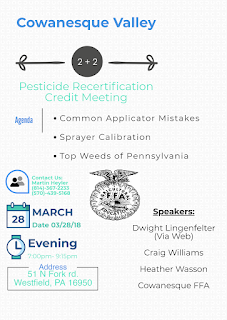Community Based Unit- CV Pesticide Meeting
 The
horticulture class at Cowanesque Valley High School had a unique hands-on
learning opportunity. Granted permission by the school district, these students,
along with other agriculture students at Cowanesque Valley had access to
coordinate and attend the first ever Cowanesque Valley Pesticide Course. This
content will connect with the Integrated Pest Management Unit. Students that
become an active coordinator for the pesticide course after learning the
material in the IPM Unit will get the chance to work along side community
partners.
The
horticulture class at Cowanesque Valley High School had a unique hands-on
learning opportunity. Granted permission by the school district, these students,
along with other agriculture students at Cowanesque Valley had access to
coordinate and attend the first ever Cowanesque Valley Pesticide Course. This
content will connect with the Integrated Pest Management Unit. Students that
become an active coordinator for the pesticide course after learning the
material in the IPM Unit will get the chance to work along side community
partners.
The
Cowanesque Valley agricultural students complete the Pesticide Educational Manual every year in horticulture. They have only had a few opportunities to
utilize what they learned outside of the classroom. This year the horticulture class
was excited when they were presented the opportunity to help be the
coordinators for the pesticide course. I feel this opportunity made the
students try harder during the IPM Unit. The coordination committee for the
pesticide course consisted of six students. Austen, Savannah, Brea, Dustin, AJ,
and Johnathan. These student expressed enthusiasm towards the community based
project. Each student was eager to create community partnerships.
Our goals
for this pesticide course was the same as our goals in the horticulture class
for the IPM Unit. Those goals were the following:
1.
Identify
common pest in Pennsylvania crops (disease, insects, and weeds)
2.
Identify
the respective associative signs with pest (sick crops, crop yield, etc.)
3.
Describe
pesticide laws and its importance in overall environmental ecology, especially
with relation to natural history.
4.
Recongnize
and explain the role of integrated pest management through legislation, public
perception, and enforcement to create discuss cuturla persepective of such.
5.
Identify
ways to receive pesticide education and pesticide certification.
6.
Explain
pesticide identification, pest management, and pesticide application.
The
content we learned in this unit was focused around relating it to common day
pest management. This was done because a majority of the students in this class
were freshman and did not have the agricultural base knowledge that others would have at an older age. Making connections to common pest management like a mouse trap or terro
to kill ants helped students understand the conent. After making a connection
with the students we would then focus on the bigger picture like agriculture.
Doing this we successfully met all our goals in the IPM Unit and for our
community based project.
The students quickly jumped the gun on making contacts. They first asked Mr. Heyler if he could bring in a sprayer that way people could physically get to work with the equipment. Then they contacted Tioga County Extension because they normally have involvement in most pesticide courses. After that they made flyers and posted them in businesses around the school district. Also, they contacted the local paper to post about the pesticide course. I assisted in getting material for folders we were going to pass out at the meeting. I used my resources at Penn State to complete this. Overall, it was a joint effect to get ready for the pesticide course.
Fast
forward to March 28th, 2018. The students are preparing for the
pesticide course. They did an amzing job keeping contacts with the community
and sponsors. That night we had fifteen people present to get credit at the
pesticide course! We were hoping for at least ten people, but we were satisfied
with more. Other than the Cowanesque Valley students helping coordinate the
pesticide course we also had Tioga and Potter County Extension agents.
Craig
Williams joined us from Tioga County Extension. He presented on Sprayer
Callibration and common applicator mistakes. Nicole Santangelo Carutis joined
us from Potter/ McKean County Exension. She presented on the 10 top ten common
weeds in Pennsylvania. Each presentation was worth two credits to each persons
pesticide license. Therefore, each person who attended received four points on
their license! To wrap- up the two hour long evening course we gave a brief instruction
on how to check your points, and left the floor open for discussion.
The
pesticide course was a success! The students took ownership in the IPM and our
community based project. We hope that Cowanesque Valley continues to offer this
course each year. It was a great way to connect to community members and
community partners.



Comments
Post a Comment